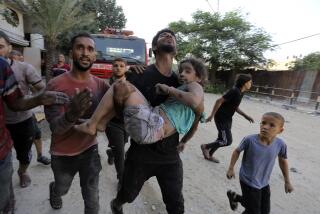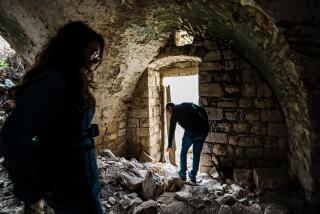Arabs Worry About What’s Next for Afghans and in Terrorism War
- Share via
LONDON — The Arabic-language Al Jazeera television network, which brought Osama bin Laden’s threatening videos to the West, has broadcast scenes of jubilation from Afghan cities as the Taliban withdrew and the U.S.-backed Northern Alliance moved in.
Like the U.S. press, Arabic newspapers have carried pictures of Afghan women casting off their veils and of men shaving their beards.
But the images of the celebrations of freedom from the Taliban’s extreme rule have been paired with scenes of summary executions of Taliban soldiers and the mutilation of corpses by Northern Alliance troops, as well as the mistreatment of prisoners.
In the Muslim world, the story of Afghanistan’s liberation is entwined with protests over human rights abuses and concerns that the country will unravel in tribal anarchy.
“What does the future hold for Kabul?” political commentator Samir Attalah asked in the London-based Arabic newspaper Al Sharq al Awsat on Friday.
He said he hoped that it would be one in which an Afghan could avoid being either “the killer or the killed . . . a solution that avoids the kicking of corpses in public, where kids are invited to watch.” But, he said, he feared that one “corpse-kicker” will replace another and that “a new generation will grow up believing life is nothing but death, killing and homelessness in the snow.”
The collapse of the Taliban has led to a scaling back of the U.S. bombing campaign at the start of the Muslim holy month of Ramadan on Friday and an apparent decline in civilian casualties from the airstrikes. This has decreased anti-American demonstrations on the streets of neighboring Pakistan and has staved off what many predicted would be an explosion of anger in the Muslim world.
“There are only two things for the Americans to do now,” said Sheik Zaki Badawi, head of the Muslim College in London. “Start emphasizing humanitarian aid rather than bombs and battle, especially during Ramadan. And don’t default in the Middle East. The U.S. always promises to resolve the Palestinian issue in a crisis, and when the crisis is resolved they forget it.”
The official Palestinian press has reported the changes in the government of Afghanistan but with little comment. Palestinian Authority President Yasser Arafat has backed the U.S. military campaign while keeping an eye on widespread anger among ordinary Palestinians over U.S. support for Israel. He is not eager to draw attention to the war on terrorism or to encourage debate.
Palestinian commentators “are busy with our own situation. They want to concentrate on the intifada and not on what is going on outside Palestine,” said Khalil Shikaki, director of the Palestinian Center for Policy and Survey Research in the West Bank city of Ramallah.
The Palestinian Authority, meanwhile, “has learned the lesson of the [1991 Persian] Gulf War,” when it supported Iraqi President Saddam Hussein against a U.S.-led coalition, he said. “It does not want to repeat the mistake. It does not want anymore isolation.”
Osama bin Laden, the chief suspect in the Sept. 11 attacks on the United States, is a folk hero to many Palestinians and other Arabs. A symbol of challenge to the U.S. superpower, he has been compared by some commentators to Spartacus, leader of the slave uprising against Rome, and to the Latin American revolutionary Che Guevara.
Anti-American sentiment remains strong among such people, said Egyptian political analyst Milad Hannah in Cairo. But after U.S. military might was unleashed on the Taliban, “people now think we better keep our hatred to ourselves.”
Those feelings are compounded by concern over where the United States might take the war on terrorism after Afghanistan, he said.
Indeed, for many in the Arab and Muslim world, the war in Afghanistan appears to be a prelude.
“While diplomats are focused on military developments in Afghanistan,” political analyst George Bakassiny wrote in the Lebanese daily Al Mustaqbal on Thursday, “international and especially Arab attention has begun to shift toward Iraq.” The speculation, he said, is that Iraq will be the next target.
In its crackdown on terrorism after Sept. 11, the United States asked the government of Lebanon to freeze the assets of Hezbollah, whose guerrillas fought the Israeli occupation of Lebanon for a decade and is still battling for disputed land. The Lebanese government has refused, saying that Hezbollah is a resistance group.
Some See Hezbollah as a Possible Target
Much of the Arab world makes a distinction between groups such as Hezbollah, Hamas and Islamic Jihad--armed groups fighting the Israeli occupation of lands they consider to belong to Arabs--and Bin Laden’s Al Qaeda terrorist network. Even many moderates consider the former to be “resistance fighters” rather than terrorist organizations, although Hamas and Islamic Jihad target Israeli civilians.
Lebanon is home to Hezbollah, and Syria supports the groups fighting Israel, which also has occupied Syrian land. Beirut and Damascus have chosen to keep quiet about the war on terrorism because they do not want to become targets, according to Nader Said, director of the Development Studies Program at Birzeit University in the West Bank.
The Taliban’s radical view of Islam was never widely popular in the Arab world, even if some people saw the Afghan regime as a David to the United States’ Goliath. After the Taliban was routed from Kabul, the Afghan capital, the pan-Arab Al Hayat newspaper highlighted the “Great News for Afghan Women: Education and Work Are Allowed Again.”
But there was widespread discontent among Muslims over a perceived double standard on the part of the U.S. in supporting the Northern Alliance, whose human rights record is as bad as the Taliban’s.
Writing about Northern Alliance executions in the London-based daily Al Quds al Arabi, commentator Adly Sadeq criticized “the hypocrisy of the United States, which, despite its continuous condemnation of terrorism and violation of human rights, failed to condemn such acts only because they were committed by an ally.”
Mohammad Naseem, chairman of Birmingham Central Mosques, echoed the sentiments, saying British Muslims resented that “normal American and British standards [of law] were pushed aside, and there was no need to establish guilt” to pursue Bin Laden and the Taliban.
In Pakistan, the level of anti-Americanism appeared to diminish with the routing of the Taliban, as if public opinion were shifting to side with “the winner.” Fewer people than usual turned out at Friday’s weekly protests organized by religious political parties to express opposition to the bombing.
But several newspapers in the Muslim world warned Americans that the war in Afghanistan is far from over and that the collapse of the Taliban regime is likely to be followed by guerrilla warfare and renewed civil strife.
Al Quds al Arabi editor Abdel Bari Atwan wrote that the U.S. went to Afghanistan not to take over Kabul “but to capture Osama bin Laden and his followers. As long as the man and his host--Mullah [Mohammed] Omar, the Taliban leader--are free, the real war has not yet started.”
*
Times staff writers Michael Slackman in Cairo and Alissa J. Rubin in Quetta, Pakistan, and special correspondents Maher Abukhater in Ramallah and Ali Khalil, Janet Stobart and Emmanuelle Soichet in London contributed to this report.
More to Read
Sign up for Essential California
The most important California stories and recommendations in your inbox every morning.
You may occasionally receive promotional content from the Los Angeles Times.













